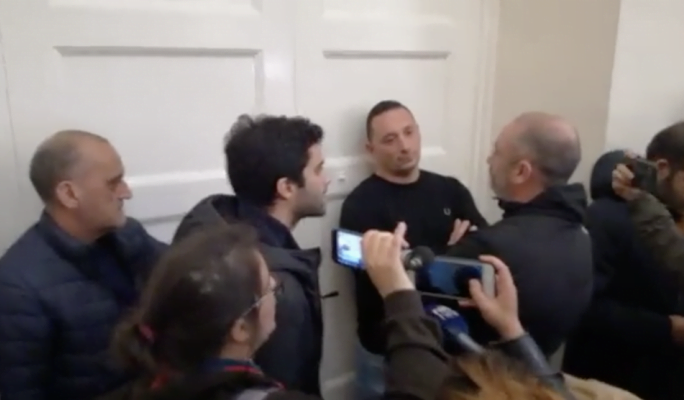The illegal detention of journalists at the Prime Minister’s Office last week was registered as a threat to press freedom on European portals supported by the Council of Europe and the European Commission.
Journalists from national and international media outlets were locked in a room at Castille on 29 November following a press conference held in the early hours of the morning.
It followed a six-hour emergency Cabinet meeting that reportedly debated the presidential pardon denied to Yorgen Fenech, the suspected mastermind behind Daphne Caruana Galizia’s assassination who has name-dropped top government officials as being involved in the plot.
Joseph Muscat made a brief announcement and only gave journalists a few moments to ask questions. Following the press conference, journalists were locked in the room for some time, prevented from leaving by individuals who claimed they were “security services”. They were later identified as Labour Party thugs.
The Mapping Media Freedom portal explains that “journalists and other media were confined to the room where the press conference was held. Unidentified persons, some of which were noted to be people normally seen in the counting halls of known security staff stood in front of the doors, impeding the exit of the journalists.”
The report noted that the journalists protested “vociferously” at the “forced arrest” as well as the fact that the Prime Minister was not prepared to answer many of their questions. Also locked inside of Castille were two of Caruana Galizia’s sons who are journalists.
The threat was also registered on the Council of Europe’s news portal. In a reply to the registered threat, the Maltese government denied detaining journalists despite live feeds from the room seen by the public as it occurred.
“Immediately the government makes it clear that no journalists were locked anywhere,” according to the reply sent to the Council of Europe. A group of “terse protestors” had managed to get into the press conference, the government insisted.
Then the government went on to say that the journalists were in fact held back until Cabinet members could walk out… undisturbed and shielded from journalists’ questions. This, the government told the Council of Europe, was “standard procedure”.
Far from being standard procedure, it was as a measure to shield Ministers from uncomfortable questions following a Cabinet meeting where negotiations were ongoing on whether Fenech would be granted a presidential pardon to spill the beans on those closest to Muscat.
Protests have continued almost daily in the capital and tensions have increased as more and more people call on Muscat to resign immediately.
Malta has more than 30 threats registered on the portal, a number of them being against The Shift. They include threats by former Minister Konrad Mizzi, and Economy Minister Chris Cardona and Finance Minister Edward Scicluna using “abusive language” to threaten The Shift.
The three Ministers are now facing a criminal investigation as a result of the Vitals Global Healthcare hospital deal and allegations of corruption and money laundering. The Shift has revealed further evidence this week of how the scam in Malta reached Europe’s poorest and most corrupt countries with the assistance of the Maltese government.
Also mentioned are the libel suits filed against Caruana Galizia, her assassination, and threats made agaist a French journalist filming at the removal of flowers and candles at the protest memorial in Valletta.












